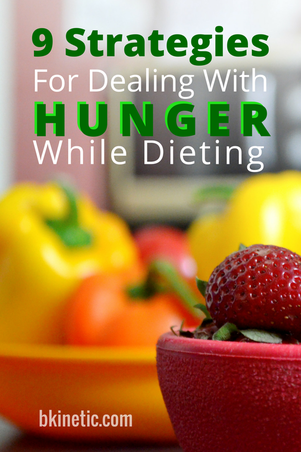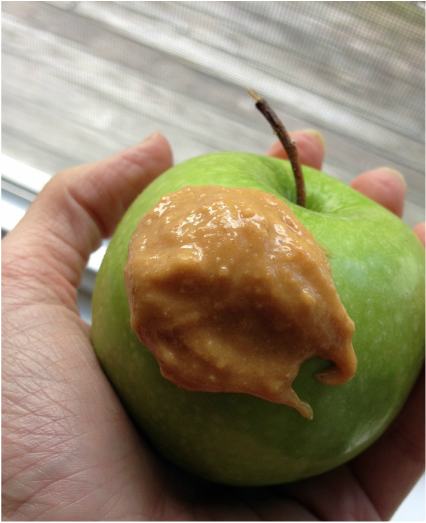While you shouldn’t be absolutely starving every hour of the day, but some hunger is to be expected. It can be really tough to deal with, especially if you’re feeling stressed with work and family obligations and just overall fatigue.
Here are 9 sure-fire tactics for dealing with hunger:
1. Add protein.
Try 10-20 grams, or ½-1 palm size portion of a lean protein like chicken breast or thigh, steak, tilapia, salmon, lean ground turkey, tuna, egg whites, or pork. You might try adding a protein shake. My faves are Cellucor, Optimum Nutrition, and Tera’s Whey.
2. Add fat.
Start with 1 Tbsp. or a portion the size of your thumb (crease to tip). Subtract a serving of starch. This can include olive oil, coconut oil, natural nut butter, avocado, olives, nuts and seeds, and whole eggs.
3. Add fiber.
Load up on veggies and fruit. They contain a significant amount of fiber, which slows down the rate of digestion, leaving you feeling full longer. It also adds water for improved hydration. Go for non-starchy veggies like Brussels sprouts, broccoli, cauliflower, salad greens, carrots, celery, jicama, peppers, green beans, pumpkin, asparagus, and celery. These provide a lot of nutrition for few calories. Choose lower sugar fruits such as apples, berries, citrus fruits, and pears.
4. Add a snack between meals.
Provided that it won’t obliterate your caloric deficit, start with 100-200 calories, preferably protein- and veggie-based. Check out a post from the B Kinetic blog archives for snack ideas here.
5. Manage stress.
Stress can make our hormones go haywire, and cause us to overeat at meals and/or snack on carb-heavy, sugary, fatty foods for comfort. Plus, stress can whittle our willpower down to nothing, leaving us struggling with cravings as well.
6. Get enough sleep.
Sleep has a similar effect as stress in that it affects our hormones, especially leptin and ghrelin, the hunger and satiety hormones. So you may feel hungrier than usual and it may take more food to feel satiated.
7. Dial back exercise.
Before you panic at this recommendation, hear me out. Our bodies are constantly in flux, seeking homeostasis. If we crank up the exercise and cut our food intake down too much, our bodies are going to respond. Sure, you’ll lose weight, but if the deficit is too big for too long, our hormones can get out of whack. Not only will we burn fewer calories throughout the day, but we’ll also experience an increase in hunger and cravings. Double whammy. This seems to be particularly true with moderate intensity cardio.
Start by cutting back on moderate and high intensity cardio, either by decreasing the duration or the frequency. If you aren’t doing much or any cardio at the moment, decrease the volume (weight x reps x sets) or frequency of your weight workouts. If you’re spending 90 minutes 5 days a week in the weight room, drop it back to 1 hour 4-5 days a week, or go a little more intensely for 20-30 minutes. Do fewer movements or sets each workout, and after a week, see how your appetite and cravings were affected.
8. Make your meals more satisfying.
This is purely for psychological reasons. When we get stuck in a rut of eating the same things over and over and over, it can make us feel deprived, which can lead to cravings. If you’ve been eating a lot of chicken, add in a lean cut of steak or a serving of fish for a few meals. Switch up your salads and side dishes. For ideas, check out SkinnyTaste.com, BudgetBytes.com, BalancedBites.com, and CookingLight.com.
9. Take a break.
If you’ve been dieting for a while, say several months, it may be time to take a break from it. I’m not talking about a free-for-all, but simply going back to maintenance level calories for 7-14 days to balance hormones and give your mind a chance to regroup and come back to the diet refreshed and recommitted. We can get so stuck in the grind of dieting down that we can get worn out mentally and physically by the stress of it all. Just as our bodies need recovery to rebuild stronger after exercise, our minds need a break too before we go off the deep end and gorge on everything in sight.
I hope these tactics help you stay the course with your diet and help you better navigate the bumps in the road. The best thing you can do is to keep track of how your body reacts to certain foods, eating schedules, and exercise programs. You are unique, so finding what works for you is paramount. What works for your best friend may backfire for you. Keep trying things out and evaluating their effects. Pretty soon, it’ll be smooth sailing. Good luck, and shoot me a message if I can help out in any way.



